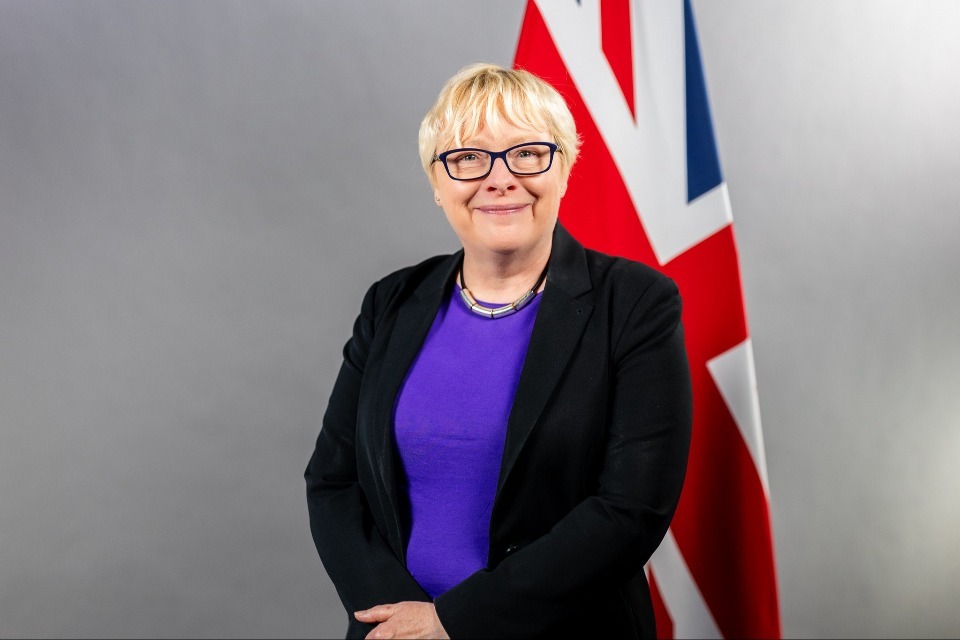I have the honour to make this statement on behalf of the following 44 participating States Albania, Andorra, Bosnia and Herzegovina, Canada, the EU and its member states, Georgia, Liechtenstein, Moldova, Monaco, Moldova, Montenegro, North Macedonia, Norway, San Marino, Switzerland, Ukraine, United Kingdom, United States of America and my own country, Denmark.
Mr. Chair, In December 2023, as we marked the 75th anniversary of the Universal Declaration of Human Rights and this year, as we mark the 75th anniversary of the Geneva Conventions, we are reminded of how nations came together in the wake of the Second World War to build a framework to ensure future peace and security so that the horrors of that war were never repeated. These seminal documents underscored the need to protect the inherent dignity and rights of all individuals, in peace and in war.
In the decades that followed, we saw progress on strengthening human rights protections. In the 1975 Helsinki Final Act, we further acknowledged that ensuring respect for human rights and fundamental freedoms is a prerequisite for lasting security and peace among and within states.
The OSCE’s comprehensive approach to security, with human rights, democracy and the rule of law at its core, is our shared commitment. Yet, in recent years, actions taken by the governments of some participating States – whether against fellow participating States or against their own people – have challenged these hard-won achievements, undermining the very progress we have collectively worked for, for so long.
Russia’s war of aggression against Ukraine, enabled by the Lukashenka regime in Belarus, and other third countries, remains the starkest example, reminding us all that human rights and fundamental freedoms are among the primary targets of an aggressor. We are gravely concerned by the findings of the 2024 OSCE Moscow Mechanism report regarding the arbitrary deprivation of liberty of Ukrainian civilians by the Russian Federation. The report detailed allegations of “widespread and systematic” violations by the Russian authorities and concluded that there are reasonable grounds to believe that war crimes and crimes against humanity have been committed. The UN Independent International Commission of Inquiry on Ukraine has also concluded that it has sufficient evidence to determine that Russian authorities have acted pursuant to a coordinated state policy and have therefore committed crimes against humanity of torture. These reports add to the ever-growing evidence of Russia’s systemic disregard for human rights and international humanitarian law.
We also remain deeply concerned by the Kremlin’s operations to forcibly transfer Ukrainian children within Russia-occupied parts of Ukraine and/or deport them to Russia. Children have been subjected to pro-Russia indoctrination and in some cases adopted by Russian families. The May 2023 Moscow Mechanism expert report concluded that this practice may amount to a crime against humanity.
We strongly condemn all violations and abuses of human rights and violations of international humanitarian law. All alleged violations of international humanitarian and human rights law, war crimes, and crimes against humanity must be duly and thoroughly investigated and those responsible held to account, including for the crime of aggression against Ukraine. All civilian detainees must be released immediately and all forcibly transferred or deported children must be returned safely to Ukraine, or to a third location, taking into account the best interests of the child.
We are also concerned that the human rights situation within Russia has deteriorated further despite the recommendations of the 2022 Moscow Mechanism Report, which clearly demonstrated the link between Russia’s domestic repression and its threats to international peace and security.
Meanwhile, in Belarus, while acknowledging the release of some political prisoners, the regime’s harsh repression of those advocating for peaceful democratic change remains ongoing, with an estimated nearly 1,300 political prisoners and credible reports of large-scale torture and other mistreatment, including incommunicado detention.
Mr Chair, The foundations of freedom, equality, and justice are under pressure across the OSCE region. An alarming rise in violence against persons based on their religion or belief, as well as overall intolerance and discrimination including antisemitism and anti-Muslim bigotry are limiting the full and equal participation and security of all people in our societies.
Civil society is an indispensable part of our countries’ conscience and an important partner in advancing the values and work of this organisation. Therefore, it is with deep regret that we observe a shrinking civic space within many OSCE participating states, including through the use of so-called foreign agent legislation or “sovereignty protection” measures. Authorities of a number of participating States beyond Russia and Belarus threaten and arbitrarily arrest and detain peaceful protesters, human rights defenders, political opponents, and journalists and media actors. We pay tribute to the individuals and civil society organisations that work tirelessly, often at great personal risk to their livelihoods and even their lives, to defend our shared dedication to democracy, rule of law, human rights and fundamental freedoms.
To that end, we highly value the Human Dimension Implementation Meeting (HDIM) as an important platform for participating states and civil society to assess the implementation of OSCE commitments in the human dimension and discuss how to improve it. While the Warsaw Human Dimension Conference has proved itself a valuable alternative, the ongoing obstruction of the HDIM is unacceptable. We emphasise the necessity of holding it next year as mandated and we will support the 2025 Chair in these efforts. Further, we commend the OSCE autonomous institutions for their vital role in promoting the implementation of OSCE human dimension commitments by participating States. Their autonomy and dedication are indispensable for advancing democracy, the respect for human rights, and the rule of law.
Recognition that respect for human rights and fundamental freedoms is integral to comprehensive security is enshrined in the decalogue of the Helsinki Final Act. We will continue to speak out when democratic principles, human rights and fundamental freedoms are violated or abused Whether it is human rights defenders, journalists and media actors facing reprisals, including imprisonment, for their brave work, or violent crackdowns on peaceful protesters aspiring for democratic change. We will continue to fight for women’s and girls’ full enjoyment of human rights and to promote gender equality. We will press for the release of all those arbitrarily detained or imprisoned for knowing and acting upon their human rights. We will keep pressing for the eradication of torture, inhuman or degrading treatment or punishment and other ill-treatment. We will continue to support free and fair elections. We will promote tolerance and non-discrimination and condemn, investigate, and prosecute hate crimes, including online. We will continue to demand accountability for the crimes committed. We will challenge stereotypes and prejudice, combat myths and disinformation with facts, and promote a world where no individual is left behind or targeted for who they are, for whom they love, for what they look like, or for what they say, believe or do not believe.
All participating States have categorically declared that commitments in the human dimension are matters of direct and legitimate concern to all participating States and do not belong exclusively to the internal affairs of the State concerned. We will continue to work for the implementation of OSCE principles and commitments.
In closing, we thank the OSCE Chairpersonship and the chair of the Human Dimension Committee as well as the autonomous institutions for their tireless work to strengthen the Human Dimension in these challenging times. Thank you.








